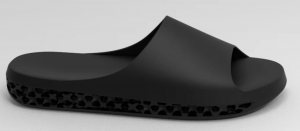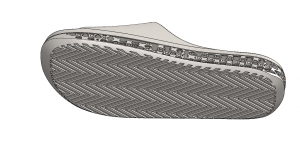The project ran between November 2020 and October 2021.
In Sweden, about 40 million pairs of shoes are imported annually, which gives a climate impact of 1.2 million tonnes of CO2-eq, corresponding to about 30 kg of CO2-eq per pair. An average shoe also contains up to 30 components, which makes recycling a great challenge with today’s available technologies. The project’s vision was to introduce an innovative circular system innovation for shoe production on the market, using textile residual streams as a resource base. It is primarily the progress, of recent years, in two areas that the project intended to build the concept on; (1) groundbreaking research in (nano) cellulose at Stockholm University (2) state-of-the-art 3D printing technology. Combining these enables a new material and product flow that can be circulated in a closed system.
The work has been structured in two work packages – one with a focus on production and one business-oriented.
In an iterative process, materials and design have been developed in the production work package, both with conventional filaments and the project’s partially recycled filaments. Focus groups have then trialled the prototypes in parallel as mechanical tests have been carried out at Stockholm University.
In the business work package, the theoretical work has been carried out, with a focus on investigating costs, market conditions and the environmental effect (CO2-reduction).
Project results include several designs and 3D-printed footwear with a variety of material combinations. The recycling process is reminiscent of chemical textile-to-textile recycling but cuts several steps by only partially breaking down the textile raw material. The project has produced two batches of pellets for 3D printing with textile raw material as an integral component. Results from trials in the focus group have been good – 60% think that the prototype produced would be salable on the market. The texture was in particular highlighted as appealing.

Participants
The Sole Theory, ZYYX Labs, Wargön Innovation and Stockholm University.
Budget
The project’s total budget was 799 000 SEK.

